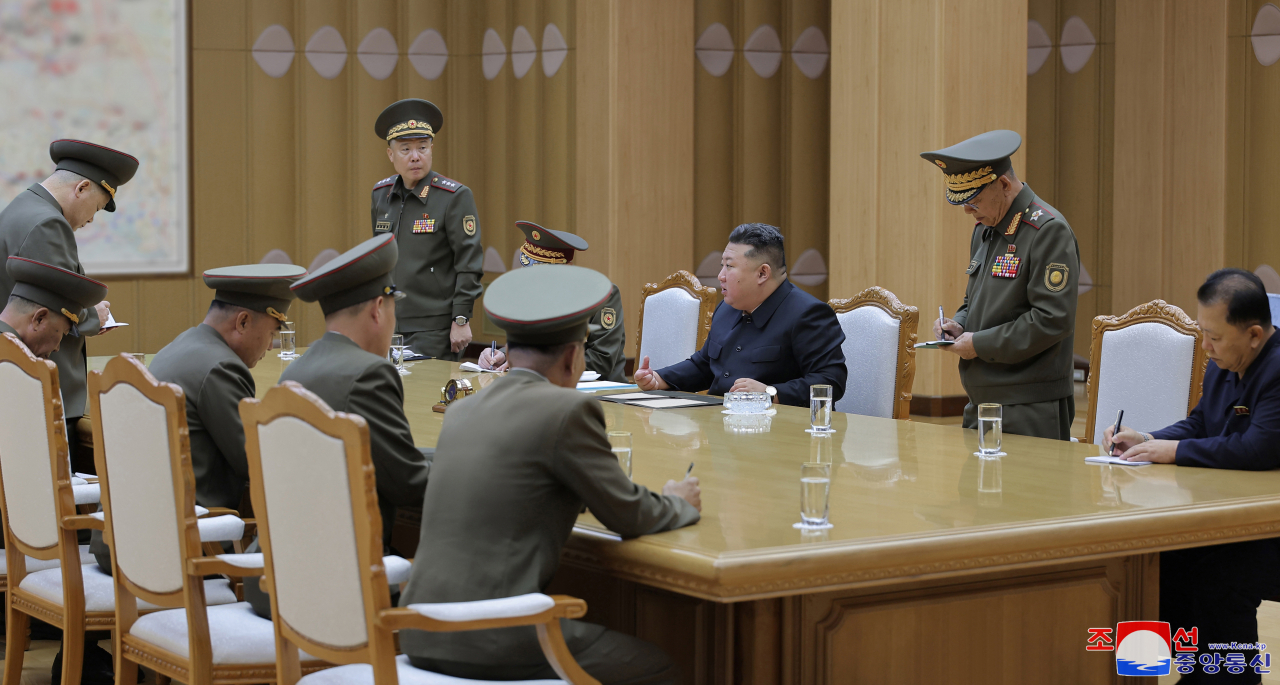 |
North Korean leader Kim Jong-un (third from right) convenes a consultative meeting on national defense and security in Pyongyang on Monday to discuss countermeasures against drones carrying anti-Pyongyang propaganda leaflets, which the North claims were recently sent by South Korea over its capital, in this photo provided by the North's official Korean Central News Agency. (Yonhap) |
North Korean leader Kim Jong-un on Monday convened an unprecedented meeting resembling a national security council, where he outlined the course of "immediate military action" in response to what his regime alleges was a South Korean drone incursion over Pyongyang, state media reported Tuesday.
The meeting came four days after North Korea’s Foreign Ministry's statement that accused South Korea of sending drones into Pyongyang’s airspace on three occasions -- Oct. 3, 9, and 10 -- under the cover of night, scattering large volumes of anti-North Korean propaganda leaflets. The South Korean military has adopted a stance of strategic ambiguity, neither confirming nor denying the allegations.
North Korea's state media reported that Kim reviewed and issued conclusions on the information and proposed measures outlined in reports from various defense and security agencies at the "consultative meeting on national defense and security."
"After hearing a report on the relevant work done by the General Staff and the major combined units' combat readiness, he set forth the direction of immediate military action and indicated important tasks to be fulfilled in the operation of the war deterrent and the exercise of the right to self-defense for safeguarding the national sovereignty, security and interests," state media reported in an English-language dispatch. "He expressed a tough political and military stand of the WPK and the DPRK government at the consultative meeting."
The WPK, or Workers' Party of Korea, is the ruling party of the DPRK, the Democratic People's Republic of Korea -- North Korea's official name.
The meeting featured a report by Ri Chang-ho, director of the General Reconnaissance Bureau, analyzing the "enemy's serious provocation that violated the sovereignty of the DPRK," according to the state media report.
Ri Yong-gil, chief of the General Staff of the Korean People's Army, outlined a military counteraction plan, while National Defense Minister No Kwang-chol detailed measures for weapons modernization. Jo Chun Ryong, secretary of the Party Central Committee in charge of munitions, reported on weapons and equipment production, alongside a briefing from the Minister of State Security on intelligence operations.
Unprecedented meeting
The Unification Ministry confirmed Tuesday that the "consultative meeting on national defense and security" was the first to be held in this format.
"Although the Central Military Commission typically serves as the main decision-making body, North Korea convened a meeting in a new format without revealing any details," a senior official at the Unification Ministry said on condition of anonymity during a closed-door briefing.
"Therefore, I believe it is important to withhold judgment on North Korea's intentions and continue observing the situation closely."
Cheong Seong-chang, director of the Center for Korean Peninsula Strategy at the Sejong Institute in Seoul, said, "It remains to be seen whether North Korea will retaliate by infiltrating drones into the South or limit its actions to a strong response if South Korean drones enter its airspace again."
Cheong also explained that "The report on the intelligence operations situation by the Minister of State Security is presumed to have addressed both South Korea’s and the international community’s responses to the current situation.”
Cheong added that the meeting also addressed military technology modernization plans and the performance of armament production.
“Given these developments, North Korea is likely to intensify efforts to modernize its drones and strengthen its drone interception capabilities,” he said.
Kim’s meeting was followed by a flurry of statements on the issue starting Friday — including four from his sister, Kim Yo-jong, and two from an unnamed spokesperson of the Defense Ministry.
In a press statement on Tuesday, Kim Yo-jong claimed that "we have obtained clear evidence that the South Korean military gangsters are the main culprits behind the hostile act of violating sovereignty by intruding into the airspace over the capital of the Democratic People’s Republic of Korea."
Kim warned that "The provocateurs will pay a severe price."
On Monday evening Kim said, "If the sovereignty of a nuclear-armed state is violated by mongrels tamed by Yankees, the master of those dogs must be held accountable," warning the United States as well.
Hong Min, a senior research fellow at the state-funded Korea Institute for National Unification, noted that the recent flurry of statements from Kim Yo-jong mirrors her "pattern of emotional response" seen in June 2020.
Back then, the sequence began with the release of anti-North Korean leaflets along the inter-Korean border from the South, followed by Kim Yo-jong’s fiery statements, a preliminary meeting of the Central Military Commission and a warning of military action, ultimately culminating in the demolition of the inter-Korean liaison office.
"North Korea tends to issue agitated statements, threaten emotion-driven military actions, and resort to shock-therapy-style responses on matters involving the regime or its leader," Hong said Monday evening.
"In this instance, heightened sensitivity regarding Kim Jong-un's safety surrounds the issue of Pyongyang's airspace, with the South Korean government’s ambiguous stance further fueling North Korea's suspicions and prompting emotionally charged military warnings."
Just hours after Kim convened the meeting, the South Korean military announced that explosions occurred along the Gyeongui and Donghae lines around noon on Tuesday, with the intent believed to be blocking key inter-Korean connecting roads.
On Wednesday, the General Staff of the North Korean Army officially announced the launch of operations to block all roads and railways leading to South Korea, coupled with plans to fortify their side with strong defensive structures, a move that came just before their accusations of a drone incursion.







